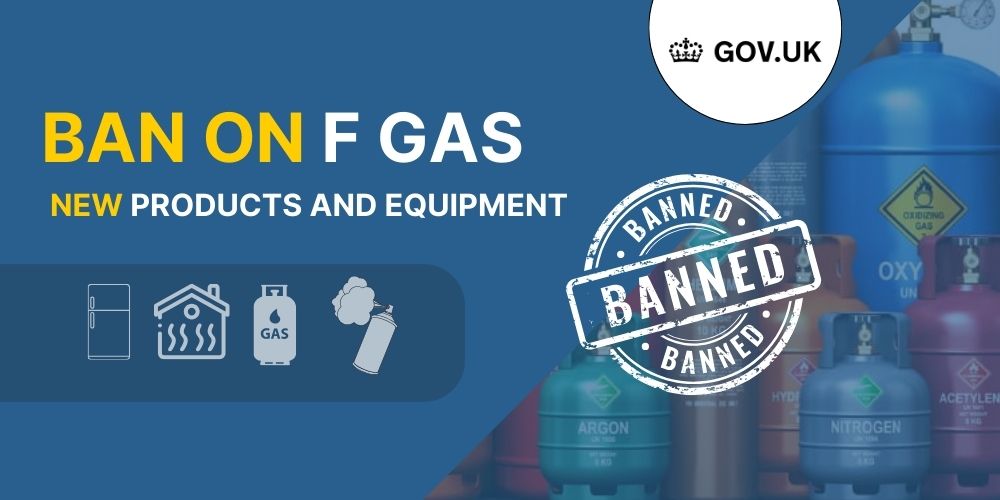As concerns about climate change intensify, governments worldwide are taking significant steps to reduce the environmental impact of various industries. In the United Kingdom, the regulation of fluorinated gases (F-Gases) plays a crucial role in these efforts. These gases, commonly used in refrigeration, air conditioning, and other industries, are potent contributors to global warming when released into the atmosphere. To address this, the UK has implemented strict regulations governing the use and importation of F-Gases, aiming to phase out high-global warming potential (GWP) substances and transition towards more environmentally friendly alternatives.
Recent Updates in GB F-Gas Regulations:
Despite the absence of immediate changes to GB F-Gas auditing regulations, broader modifications within the F-Gas regulatory framework are currently underway, and stakeholders should take note. Notably, while R134a commonly used refrigerant—has not faced a complete ban, certain restrictions have been imposed on its usage.
A cornerstone of the UK’s F-Gas regulations involves a substantial reduction target for Hydrofluorocarbons (HFCs) by 79% by 2030, benchmarked against the average usage between 2009 and 2012. The latest phase of this reduction plan commenced on January 1, 2024. Consequently, organizations involved in importing HFCs have received reduced quota allocations, aligning with the phasedown strategy.
Furthermore, a schedule of prohibitions has been enacted to prevent the importation of specific types of equipment containing R134a, a refrigerant notorious for its high Global Warming Potential (GWP) of 1430. Similar refrigerants with similarly high GWPs are also subject to these import restrictions.
These measures underscore the UK’s commitment to curbing the use of high-GWP refrigerants within the F-Gas industry. By implementing restrictions and outlining phased reduction plans, the aim is to significantly mitigate the environmental impact associated with these potent greenhouse gases.
To navigate these evolving F-Gas regulations effectively, stakeholders engaged in importing or utilizing refrigerants and related equipment should stay informed and adaptable. Compliance with these regulations not only aligns with environmental sustainability objectives but also contributes to mitigating the detrimental effects of high-GWP substances on the planet’s climate.
As these regulations continue to evolve, staying updated and adjusting practices accordingly is paramount. This ensures compliance with changing standards and promotes a more environmentally conscious approach within the refrigeration and air conditioning sectors.
Learn more about F gas Certification : https://www.bsassociate.co.uk/f-gas-reporting-equipment-pre-charged.php
Refrigerants: Ban on F Gases in New Products
The UK has imposed bans on specific types of F gases, notably Hydrofluorocarbons (HFCs) and perfluorocarbons (PFCs), in various refrigeration equipment to minimize their adverse environmental impact. Here’s a breakdown of the banned uses and their associated global warming potentials:
| Type of F Gas | Banned Uses | Global Warming Potential |
|---|---|---|
| HFCs & PFCs | Non-confined direct evaporation systems | All |
| HFCs | Domestic fridges and freezers | Above 150 |
| HFCs | Stationary refrigeration equipment | Above 2,500 |
| HFCs (specific types) | Commercial refrigerators and freezers (hermetically sealed) | Above 150 |
| Any F Gas | Multipack centralized refrigeration systems (rated capacity ≥ 40 kW) | Above 150 |
Insulating Foam: Restrictions on F Gases
F gases used in insulating foam products are also subject to bans in the UK. These bans focus on certain types of F gases in specific applications to mitigate their environmental impact:
| Type of F Gas | Banned Uses | Global Warming Potential |
|---|---|---|
| All F Gases | One component foam aerosols | Above 150 |
| HFCs | Extruded polystyrene foam (XPS) | 150 |
| HFCs | All foams, including polyurethane | 150 |
Aerosols: Prohibition of F Gases in New Products
In the realm of aerosols, the UK’s regulations prohibit certain F gases in new products, focusing on their global warming potential:
| Type of F Gas | Banned Uses | Global Warming Potential |
|---|---|---|
| HFCs | Novelty aerosols (e.g., ‘silly string,’ signal horns) | Above 150 |
| HFCs | Technical aerosols (e.g., computer keyboard cleaners) | Above 150 |
Fire Protection Systems and Other Uses
Specific bans on F gases in new fire protection systems are not explicitly outlined in the regulations. However, the use of sulphur hexafluoride is banned in magnesium smelting processes.
Moreover, beyond refrigerants, foam, and aerosols, the bans extend to diverse products, forbidding the use of F gases in items like tires, windows, footwear, and certain refillable containers for specific purposes.
Exemptions and Requesting Exemptions
Notably, exemptions from these bans are possible under certain circumstances, such as demonstrating lower greenhouse gas emissions, enhanced efficiency, or lack of viable alternatives. Manufacturers and entities can request exemptions by providing evidence and reports that meet the exemption criteria through designated channels, a process that typically takes up to 12 months for evaluation and may last up to 4 years if granted.
The UK’s stringent regulations concerning the ban on F gases in new products and equipment underscore the country’s commitment to mitigating climate change and fostering the adoption of environmentally sustainable practices across industries. These measures align with global efforts to combat greenhouse gas emissions and pave the way for a more sustainable future.
Learn more about F gas Certification :
https://www.bsassociate.co.uk/f-gas-reporting-equipment-pre-charged.php

